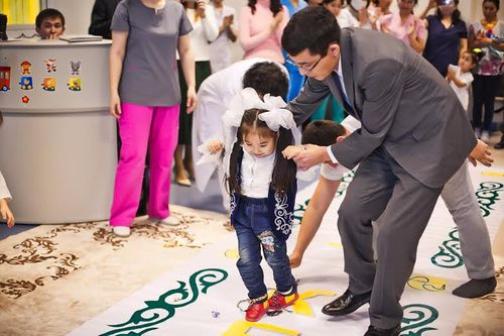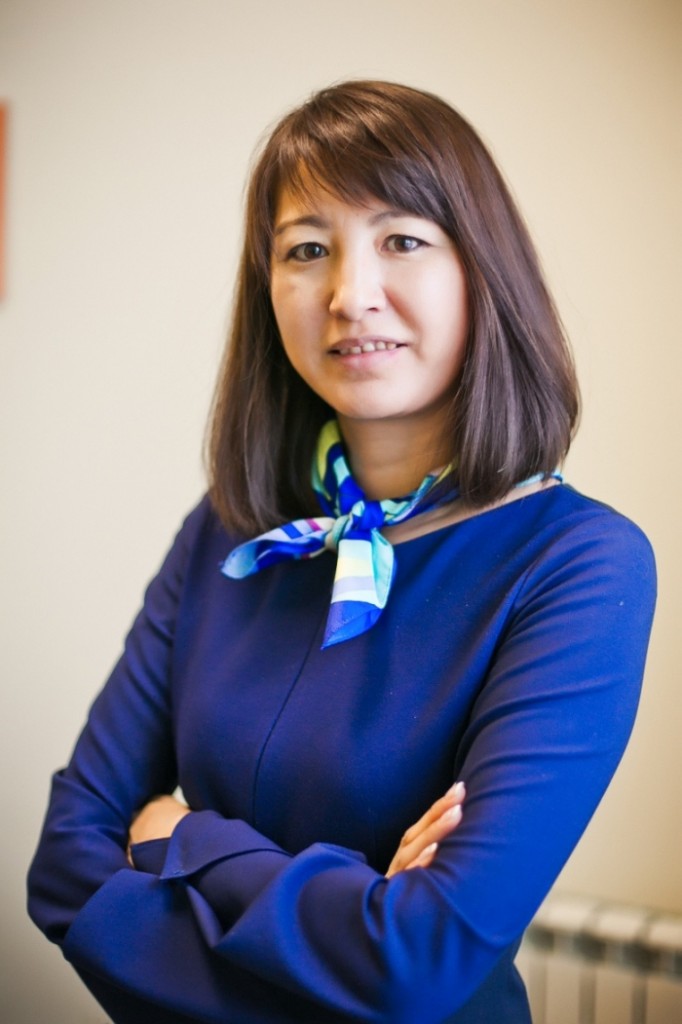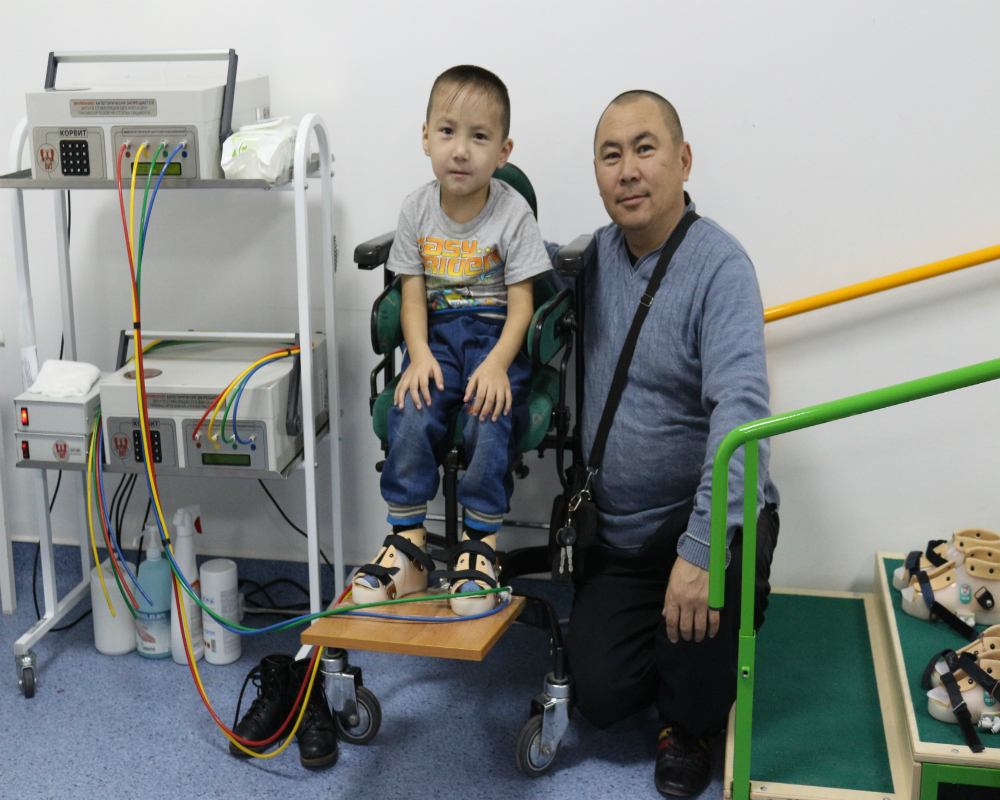ASTANA – The Kasietty Zhol (Sacred Path) Public Foundation was established in 2009 to provide charitable assistance to children from underprivileged families, orphanages and children’s homes. Director Gulmira Abeldinova believes children have great capabilities; they only need a little help. In an interview with The Astana Times, she talked about the foundation’s activities, goals and hopes.
“The history of the foundation started when I saw kids from the Astana children’s home who were unable to sit, hold a toy in their hands and chew food without help. A doctor at that institution asked me to give those children a chance for recovery. Then, we brought them to foreign countries for treatment and surgery. The most surprising thing was that after treatment, the vision of those kids improved; some kids started to take steps, walk independently and hold a spoon. They got great happiness to be close to their mothers. Of four children, two kids returned to their biological families; one was adopted by a couple,” Abeldinova shared with the paper.
This story gave Abeldinova an understanding that there were no “hopeless” children or “irretrievable” cases. It was too challenging, however, to take all kids with cerebral palsy abroad. It was expensive, there were many needy children and the majority of special children needed constant and long-term rehabilitation. It was also difficult for children to stay outside the home for a long period. Therefore, it became necessary to develop rehabilitation in Kazakhstan and the foundation gradually moved away from targeted assistance to comprehensive assistance.
“In general, the foundation’s history tells a history of happy coincidences. In 2013, we met a wonderful person, Dr. Ainura Nurkhodzhayeva, who dreamed of opening a rehabilitation centre for children with cerebral palsy. The foundation had a desire to help and the concept of this assistance, as Ainura possessed professionalism. Then, we got assistance from the Samruk Kazyna Sovereign Wealth Fund in the face of Darkhan Kaletayev. He is an amazing man who understood the problem and found a constructive approach. Thus, we opened the first Kasietty Zhol rehabilitation centre in 2014 in Astana,” said Abeldinova.
The centre covers an area of 350 square metres and employs 20 specialists. The staff involves people with kind hearts, cheerful character and great professionalism. From morning until evening, they are involved in activities with children and study during the intervals between courses of intensive rehabilitation.
“We invest a lot in our staff training, because we want to show that it is not necessary to go abroad for quality rehabilitation. We have created a model of rehabilitation that became successful. The parents of special children and our partner recognised its effectiveness. Now we are introducing this experience throughout the country, opening small rehabilitation centres. The second centre will open in Shymkent. In this centre, we will take infants with a cerebral palsy risk. We believe that after the rehabilitation, at least half of these babies will not be diagnosed with cerebral palsy later. Thus, gradually we will open centres in each region,” she said.
The organisation is implementing three major projects. Under Healthy Kids, specialists provide rehabilitation assistance to children from poor families and children’s homes.
“Unfortunately, the number of children with cerebral palsy in our country is large and it is growing every year. Today, there are more than 19,000! The country lacks places of free rehabilitation and children are forced to wait for years. Project Healthy Kids was created three years ago to address this situation,” said Abeldinova.
During the past three years, 763 kids have undergone comprehensive rehabilitation. The centre is equipped with excellent facilities. Competent physical rehabilitation featuring the best techniques of neuro-rehabilitation and equipment has resulted in significant improvements in the children’s conditions.
“We have a wonderful tradition to hold a ‘Tusau Kesu’ (literally “cutting the rope”) ceremony for a child that learns to do the first steps despite the age. It is very touching; a life-affirming ritual symbolising the victory of a child over the illness and over the circumstances. In addition, this ritual gives hope to other mothers of special children. For such moments, we need to work hard and never give up,” said Abeldinova.
School of the Mentors focuses on developing human capital, expanding knowledge and exchanging experience with leading experts in the field of medicine. Under the project, scientists and practitioners from the UK, the UAE, Russia, Germany and Turkey arrive in Kazakhstan and hold training for local specialists.
“Earlier this year, we invited specialists from Russia’s Dmitry Rogachev Centre for Paediatric Haematology to teach paediatric oncologists-resuscitators to set infusion ports for chemotherapy. Previously, children went to Europe to install and remove the port. Now, there is no need to leave the country. Of course, the training of the Kasietty Zhol Rehabilitation Centre staff is our priority. By investing in their education, we get high quality rehabilitation,” she said.
Through #KazakhstanTvoritDobro (Kazakhstan does good deeds), designer Gaukhar Zhumabekova decorated walls of Astana Children’s Hospital No. 2. She created amazing drawings, looking at which cure and treatment are becoming merrier.
“The Academy of Arts’ students took up this initiative and painted the walls of the neurology unit in the same hospital. We also had volunteers at district hospitals in the South Kazakhstan region. Again, we met a wonderful girl Aikerim Zhumagaliyeva who encouraged volunteers to paint the walls in the regional children’s hospital of Shymkent, where we are planning to open the second centre,” said Abeldinova.
This project implies a variety of interesting activities, but its main purpose is to draw attention to the problems of children with cerebral palsy and launch 14 rehabilitation centres throughout Kazakhstan. Regardless of profession, gender, age or religion, people show their kindness and compassion and achieve common goals.
“I chose a career when I studied at school. I am a speech pathologist. Thanks to the profession, I have always been close to these children and their families. Now, it is a great happiness for me to be able to help them, although it is unbearable to see the tears of mothers, desperate fathers and sadness in the eyes of the children. Happy people do not come to our foundation. People come with pain and problems and ask for help. Nevertheless, the success of these children and relighted hope in the eyes of parents inspires us to go further,” she said.



